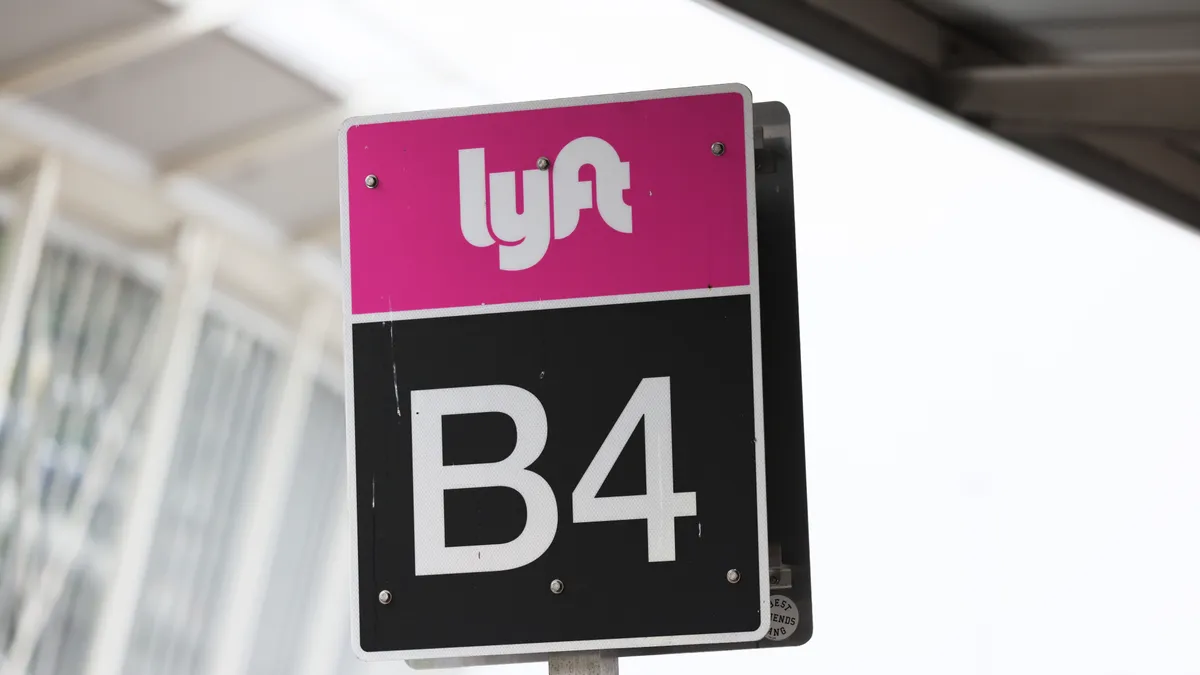Dive Brief:
- Shares of rideshare Lyft rose 35% Wednesday after a flawed and excessively positive earnings report following the close of market trading on Tuesday catapulted the stock in after-hours trading to a brief, stratospheric high.
- Rather than expecting adjusted EBITDA margin expansion of 500 basis points for the full year 2024 or 5% of growth as initially reported, Lyft anticipates growth of .05% or 50 basis points, CFO Erin Brewer told analysts, flagging the error during the company’s fourth-quarter and full-year earnings call held after stock trading ended on Tuesday.
- This is “actually a correction from the press release,” Brewer said Tuesday. The extra zero triggered a 67% spike in Lyft shares during after hours trading. Although news of the error wiped out about half of that gain, Lyft closed at the end of regular trading on Wednesday at a 52-week high with shares at $16.39.
Dive Insight:
Lyft CEO David Risher said Wednesday on CNBC’s “Squawk Box” that the news release with the extra zero was “a bad error — and that’s on me.” The mistake was “super frustrating” for Lyft, he said, and “a terrible thing.”
The margin expansion figure has already been changed in the company’s materials, and Lyft has issued an 8-K filing with the Securities and Exchange Commission “to correct and flag the clerical error,” a company spokesperson confirmed to CFO Dive via email.
The report of 5% growth would have constituted a big jump in performance for the company, which has struggled to reach profitability since it went public in 2018. With the corrected figure, Lyft’s profit margin as a percentage of bookings will be 2.1% compared with 1.6% in 2023, Brewer said Tuesday during the earnings call.
Both Risher and Brewer said that the rideshare company logged a strong fourth quarter.
Both gross bookings and riders reached an all-time high for Lyft, which grew bookings by 14% year-over-year to reach $13.8 billion for the full year, according to its earnings results. For the quarter ended Dec. 31, Lyft reported gross bookings of $3.7 billion, a 17% increase from the prior period.
Lyft recorded more than 40 million riders for the full year, with 709 million rides, an 18% jump year-over-year. The company saw a bump in rides to stadiums for events such as tours by Taylor Swift and Beyonce, and sporting events such as the U.S. Open. Bookings for such trips grew 35% year-over-year.
The increase in gross bookings represents strong ride growth, but the gains were “partially offset by lower prices year-over-year given our competitive focus and improving the health of our marketplace,” Brewer said Tuesday during the earnings call.
Lyft has taken repeated steps in an attempt to outpace rival Uber, including walking back unpopular policies such as “surge pricing,” where riders are charged higher fees at particular times of day.
The company also laid off 1,110 employees in April in an effort to reduce costs and prices and increase pay to drivers, Risher said at the time.
The layoffs were announced about a week after Risher, a former Amazon executive, moved into the CEO chair at Lyft. Brewer, a veteran of Charles Schwab and Atlassian, took the CFO chair in May, just two months after Risher’s appointment, CFO Dive previously reported.
The company announced last week it will pay the difference if drivers earned less than 70% of what riders paid after external fees. The company estimates drivers earn approximately $23.46 per engaged hour following expenses — which they estimated at about $7.02 per hour.
However, drivers’ earnings can vary based on a number of key factors, including location, time of day and the type of ride, which influence what riders pay for their trips. Estimates by Ridester.com — a website which shares online tips for rideshare drivers and other gig workers — put the cost for a standard, five mile Lyft ride between $9 to $18. Costs can swing widely from city to city; riders in New York City pay approximately $1.75 per mile on average, while riders in Chicago averaged about $0.81 per mile.
Lyft’s 70% guarantee also follows a November 2023 settlement by both Lyft and Uber with the New York Attorney General’s Office regarding a suit alleging unfair labor practices, including that drivers had not been properly paid for years. The agreement included the set up of a $38 million fund on behalf of Lyft and a $290 million fund on behalf of Uber for back payments to eligible drivers, who will be able to apply for funds beginning March 1, according to materials from the NY AG’s office.












